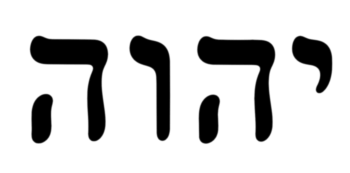|
V RaptureChrist Newsletter
|
||||
The name of God in ancient Hebrew, comprised of four letters, holds tremendous reverence, for, as mentioned in the ten commandmentsÖyou shall not take the name of your God in vain. This means we should not go about pronouncing God's name the way we talk about other common things, such as our watch or keys, because this is irreverent, and we should have respect when we choose to, essentially, call upon God.
Tetragrammaton (God's Name)The tetragrammaton has been historically reserved for religious occasions and often utilized only by special members of the holy tribes of Israel. In ancient times, the name of God was pronounced once a year during the most holy of Jewish holidays, Yom Kippur, by the most high priest or cohen gadol. The pronunciation of the name of God was held in such reverence that the correct enunciation is still debated today, meaning that, despite our best intentions, perhaps we are incorrectly pronouncing the name of God. I have often wondered if the Spanish word for "key" (llave) could be the real and correct pronunciation for the tetragrammaton of God's name. Although, Iím quite sure God still hears us, perhaps he prefers it that we remain ignorant of the correct pronunciation anyway, since very few of us, truly perhaps none at all, are actually doing, or even trying to do, His will. However, I would like to think that if I were to call upon the name of God, perhaps on that one day per year, or under a severe moment of duress, I would pronounce it correctly. God knows, I donít like it too much when people mispronounce my name, or people who constantly demand my attention for mundane things. Who are we calling, when we call upon God or the name of God? Is it God, the creator? What about the Messiah Yeshua or the holy spirit? Are they not one, the holy trinity: God the Father, Messiah the Son, and the Holy Spirit or ruah hakodesh? Then could the name of God be a way to call all three? What if the lettering of the name of God was just that? Only that, the name of God in Hebrew has four letters, not three... well, sort of. There are four letters, but only three different ones, because one of the letters is repeated. Consider that the name of God, read from right to left in Hebrew is composed of the letter Yod, the Y; Heh, the H; Vav the V; and Heh, the H. So when you call upon your God YHVH, remember you may be calling on all three: the Father, the Son and the Holy Spirit. Remember the commandment that says
"you shall not use the name of your God in vain", and honor the name of YHVH God by living a righteous life. |
The Tetragrammaton or YHVH is comprised of four Hebrew letters each with a numerical value and also a significance. The Yod or Y is equal to the number 10. It is the only letter that is suspended in midair and singular in form. In its singularity, Yod signifies the Oneness of God who is indivisible. Yod, being the smallest of all the letters in the Hebrew alphabet, signifies the importance of humility. Yod is the first letter of Yom
(day). The holiest day in the Jewish calendar, Yom Kippur (the day of
atonement), is heavily associated with the letter Yod. It falls on the tenth day of the month of Tishrei. It marks the end of the Ten days of Awe, further emphasizing the significance of the Yod, so small and yet so powerful. The name of God (YHVH) and Israel both begin with the letter Yod. It is said, that the people of Israel, the Chosen people, were the smallest and most humble of nations, and it is through them that we understand and possess the meaning of the fourth commandment, to keep the Sabbath or the seventh day, when God rested from His creation. The material egocentrical nature of mankind is something that is prevalent on this Earth, however, not in other places in the universe, because we know there are other places in the heavens where the will of God is done. |
|||
